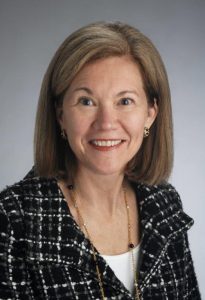Integrative Health is Redefining Medicine
 Jeanne Drisko, MD, founder of Integrative Medicine at the University of Kansas Medical Center and a nationally recognized clinician, educator, and researcher in nutrition and integrative health, vividly remembers the turning point in her career. It was in the 1980s, and after years of practicing conventional medicine six or seven days a week, often on night call for a week at a time, she was burnt out.
Jeanne Drisko, MD, founder of Integrative Medicine at the University of Kansas Medical Center and a nationally recognized clinician, educator, and researcher in nutrition and integrative health, vividly remembers the turning point in her career. It was in the 1980s, and after years of practicing conventional medicine six or seven days a week, often on night call for a week at a time, she was burnt out.
Many times on her days off, Dr. Drisko could not muster the energy to get out of bed, and she could not fathom why she was perpetually fatigued. Then a physician friend suggested that she begin taking nutritional supplements. Dr. Drisko’s medical school training had discouraged their use, so she had long held an anti-supplement bias. But within two weeks of taking supplements, she felt much better. In retrospect, she says, she was suffering from adrenal fatigue, a condition about which her medical training had taught her nothing.
Annoyed by this training deficiency and fueled with a newfound sense of purpose, Dr. Drisko began seeking out information for herself. She attended integrative medicine conferences, followed the field’s thought leaders, and eventually, began training with Hugh Riordan, MD, an integrative medicine pioneer. The year she spent training with Dr. Riordan, “opened up an incredible world” for her, Dr. Drisko said.
For instance, the use of high-dose IV Vitamin C as a therapy “was nothing short of miraculous.” She saw it reverse symptoms in fibromyalgia patients and cancer patients alike. Eventually, she developed an interest in environmental toxicity after she began seeing more patients in their 30s with low levels of sex steroid hormones, dysfunctional thyroids, bowel disease, and fatigue. Through a process of testing, she discovered that these patients had alarming levels of chemicals in their system – chemicals of the kind found in paint solvents, plastics, makeup, and personal care products.
In describing how she treated these patients, Dr. Drisko likens medicine to a tree, with conventional medicine and all its diagnoses as the branches and leaves. But to treat her patients properly, she says, she moved down to the roots, looking at their biochemistry, the quality of the soil, and the nutrients being absorbed. Essentially, she wanted to know what nutrients her patients lacked and what chemicals they needed to eliminate.
Through lab testing for micronutrients like vitamins, minerals, and good fats, Dr. Drisko was able to recommend the clean food and nutrients her patients needed, and, over the years, she has helped countless such patients this way. “If you can clean up a person’s infrastructure,” Dr. Drisko says, “they will get better on their own.”
Her 20 years of integrative medicine practice has only cemented her belief that one of the most important aspects of medical care is the doctor’s relationship with the patient. Sadly, she thinks that in the current healthcare environment, insurance companies and drug companies have fractured this bond, so the resulting frustration that many physicians experience should not be a surprise. To young medical students, she advises: keep an open mind, read broadly, and be a lifelong learner.
The American Board of Physician Specialties® (ABPS) hails Dr. Drisko as an inspiration for physicians seeking to pursue a medical approach that reaffirms the bond between doctor and patient and treats the root cause of illness instead of the symptoms. Through our Member Board, the American Board of Integrative Medicine (ABOIM), we offer qualified physicians certification in this emerging specialty. For information about our eligibility requirements, contact the ABPS today.










